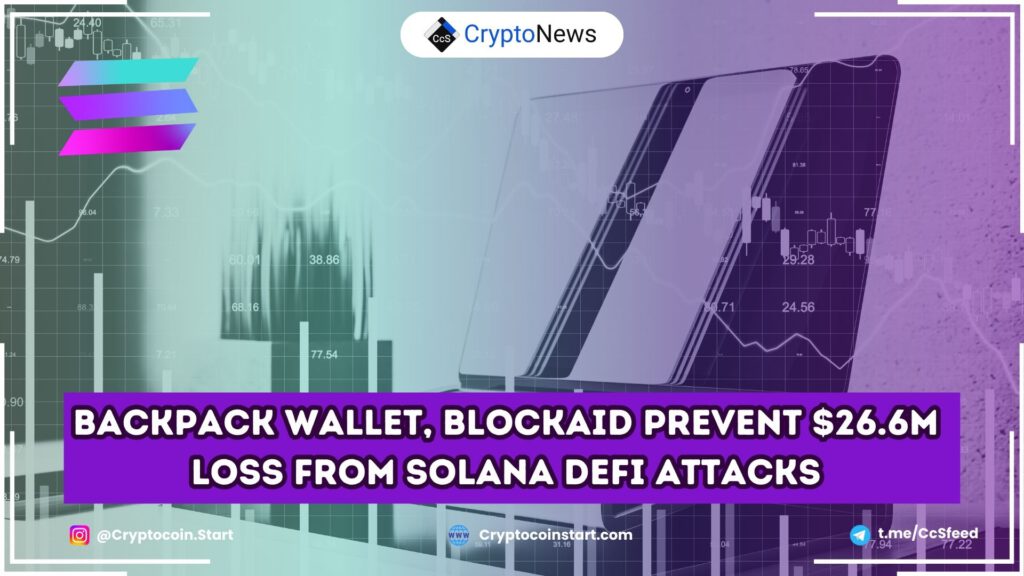
Malicious Transactions Identified Through Security Partnership
The malicious transactions were detected through a partnership between Backpack Wallet and the security firm Blockaid. Together, they scanned over 180 million transactions from Backpack’s Solana-based users during the reported period. The analysis aimed to identify and block harmful transactions, ultimately safeguarding users from potential financial loss.
Blockaid’s CEO, Ido Ben-Natan, spoke with Cointelegraph, explaining that the threats involved various malicious decentralized applications (DApps), scam transactions, and harmful contracts targeting Solana users. Ben-Natan emphasized the importance of recognizing these threats, as they directly affect end-users on the Solana network.
Solana Ecosystem Targeted by Scammers
According to Ben-Natan, Solana users are increasingly targeted by scammers and malicious actors due to the rising activity surrounding memecoin trading on the platform. The attacks are often perpetrated by the same groups that typically operate within the Ethereum Virtual Machine (EVM) ecosystem. He added:
“As EVM-based networks are more mature, security measures are more effective, making it harder for attackers to successfully target users. As a result, they have shifted their focus to Solana.”
Phishing Attacks Remain a Major Threat
Phishing remains one of the most common and dangerous threats to crypto wallet users. In a typical phishing scam, attackers deceive users into linking their wallets to fraudulent services or websites. In September 2024 alone, phishing attacks resulted in approximately $46 million being stolen from 10,800 investors. These attacks contributed to a staggering $127 million in losses over the third quarter of 2024, according to Web3 security firm Scam Sniffer.
The largest single loss during this period was $32.43 million, stolen in an attack involving a fraudulent permit phishing signature on Spark Wrapped Ethereum (spWETH).
Solana’s Security Catching Up to EVM Ecosystem
As Solana strengthens its security tools to better match those used in the Ethereum ecosystem, attackers are likely to target alternative blockchains. Ben-Natan highlighted that some malicious groups, such as Angel, are already shifting their focus to other blockchain networks like Tron and TON.
“We are already seeing this happen in practice, with attackers moving away from Solana to target other networks,” Ben-Natan explained. “As blockchain security improves, attackers adapt, and new platforms become the next targets.”
Protecting Crypto Users: A Collective Effort
While many crypto users are urged to remain vigilant against phishing scams, Ben-Natan believes the responsibility shouldn’t fall solely on individuals. He emphasized that rather than simply advising users on how to avoid scams, the industry should focus on creating better protections to prevent these attacks from happening in the first place:
“Attackers are always moving forward, looking for weaknesses. It only takes one incident for a user to lose everything. The industry needs to focus on safeguarding users, not just advising them on what to avoid.”
The Bigger Picture: Rising Crypto Hacks and Losses
The risks associated with crypto investments continue to grow. According to a report from CertiK, the total losses from crypto hacks during the last quarter amounted to $753 million across 155 separate incidents. These figures highlight the ongoing vulnerabilities in the crypto space and the urgent need for enhanced security measures across all platforms.
As malicious actors evolve their tactics and new threats emerge, it’s clear that both individual users and the wider crypto ecosystem must remain proactive in securing their assets. For Backpack Wallet users, the partnership with Blockaid is a step in the right direction, helping to identify and block malicious transactions before they can cause harm.
Conclusion: How to Stay Safe in the Crypto Ecosystem
As the Solana network continues to grow in popularity, so too does the number of malicious actors targeting its users. By leveraging partnerships with security firms like Blockaid, Backpack Wallet is taking significant steps to protect its users from scams and malicious attacks. However, crypto security is a shared responsibility. While users must stay vigilant, the industry must focus on enhancing protections and making it harder for attackers to succeed.
In the meantime, crypto investors should always be cautious of phishing scams and other suspicious activities. Security measures, such as enabling two-factor authentication (2FA), using hardware wallets, and regularly monitoring transaction activity, can help reduce the risk of becoming a victim.

